Issue Number 37, Summer 2017
Contents
- Sunflower Sutra by Allen Ginsberg (1926-1997)
- Bee by George Bilgere
- Canoeing by William Stratton
- Deboning Trout by Sydney Doyle
- End of the Road by Donelle Dreese
- Estuary by H.R. Webster
- Horse liturgy by Tobey Hiller
- In Spiral Arms by Amy Collier
- In the Mix by Gene Berson
- Intersecting the Snake by Iza Bruen-Morningstar
- Latrodectus by Christopher Greer
- Loonshine by Richard Sederstrom
- My Anima, My Doe by Laurette Folk
- Night of the Frogs by Richard Lebovitz
- Southern Oscillation by Samantha Grenrock
- Subject to Contract by Vernita Hall
- Suburban Scene by David Denny
- Tearing Out the Blue Girls by Jeremy Cantor
- Tupelo Coyote by Wren Tuatha
- We'll Cross that Bridge ... by Juditha Dowd
- White Tango by Derek Otsuji
- Without the Flood by Jacqueline Balderrama
Archives: by Issue | by Author Name

Sunflower Sutra
by Allen Ginsberg (1926-1997)
Allen died on an island between the Hudson and East Rivers, a few blocks from the East River.
I walked on the banks of the tincan banana dock and sat down under the huge shade of a Southern
Pacific locomotive to look at the sunset over the box house hills and cry.
Jack Kerouac sat beside me on a busted rusty iron pole, companion, we thought the same thoughts of
the soul, bleak and blue and sad-eyed, surrounded by the gnarled steel roots of trees of machinery.
The oily water on the river mirrored the red sky, sun sank on top of final Frisco peaks, no fish in that
stream, no hermit in those mounts, just ourselves rheumy-eyed and hung-over like old bums on the
riverbank, tired and wily.
Look at the Sunflower, he said, there was a dead gray shadow against the sky, big as a man, sitting
dry on top of a pile of ancient sawdust—
—I rushed up enchanted—it was my first sunflower, memories of Blake—my visions—Harlem
and Hells of the Eastern rivers, bridges clanking Joes Greasy Sandwiches, dead baby carriages, black
treadless tires forgotten and unretreaded, the poem of the riverbank, condoms & pots, steel knives,
nothing stainless, only the dank muck and the razor-sharp artifacts passing into the past—
and the gray Sunflower poised against the sunset, crackly bleak and dusty with the smut and smog
and smoke of olden locomotives in its eye—
corolla of bleary spikes pushed down and broken like a battered crown, seeds fallen out of its face,
soon-to-be-toothless mouth of sunny air, sunrays obliterated on its hairy head like a dried wire
spiderweb,
leaves stuck out like arms out of the stem, gestures from the sawdust root, broke pieces of plaster
fallen out of the black twigs, a dead fly in its ear,
Unholy battered old thing you were, my sunflower O my soul, I loved you then!
The grime was no man’s grime but death and human locomotives,
all that dress of dust, that veil of darkened railroad skin, that smog of cheek, that eyelid of black
mis’ry, that sooty hand or phallus or protuberance of artificial worse-than-dirt—industrial—modern
—all that civilization spotting your crazy golden crown—
and those blear thoughts of death and dusty loveless eyes and ends and withered roots below, in the
home-pile of sand and sawdust, rubber dollar bills, skin of machinery, the guts and innards of the
weeping coughing car, the empty lonely tincans with their rusty tongues alack, what more could I
name, the smoked ashes of some cock cigar, the cunts of wheelbarrows and the milky breasts of cars,
wornout asses out of chairs & sphincters of dynamos—all these
entangled in your mummied roots—and you there standing before me in the sunset, all your glory in
your form!
A perfect beauty of a sunflower! a perfect excellent lovely sunflower existence! a sweet natural eye to
the new hip moon, woke up alive and excited grasping in the sunset shadow sunrise golden monthly
breeze!
How many flies buzzed round you innocent of your grime, while you cursed the heavens of the
railroad and your flower soul?
Poor dead flower? when did you forget you were a flower? when did you look at your skin and decide
you were an impotent dirty old locomotive? the ghost of a locomotive? the specter and shade of a
once powerful mad American locomotive?
You were never no locomotive, Sunflower, you were a sunflower!
And you Locomotive, you are a locomotive, forget me not!
So I grabbed up the skeleton thick sunflower and stuck it at my side like a scepter,
and deliver my sermon to my soul, and Jack’s soul too, and anyone who’ll listen,
—We’re not our skin of grime, we’re not dread bleak dusty imageless locomotives, we’re golden
sunflowers inside, blessed by our own seed & hairy naked accomplishment-bodies growing into mad
black formal sunflowers in the sunset, spied on by our own eyes under the shadow of the mad
locomotive riverbank sunset Frisco hilly tincan evening sitdown vision.
Berkeley, 1955

From Collected Poems, 1947-1980. Reprinted with permission of HarperCollins Publishers.
© Allen Ginsberg (1926-1997)

Bee
by George Bilgere
George lives near Lake Erie on the Euclid Creek watershed.

A dead bee on the table.
Like seeing a celebrity.
Somewhere a beekeeper,
priestly in his vestments,
is missing him
in the golden congregation.
This little worker died
far from home. We’ll have that
in common, I suppose,
my own home now a highway,
my childhood an elegy
my sisters and I
never stop revising.
Hollyhocks and honeysuckle.
Buzz and pollen all summer long.
I sit here with the spent
bullet of him, the stalled
machinery, until
my coffee comes. Then
I brush him to the sidewalk
with the leaves and butts.
© George Bilgere

Canoeing
by William Stratton
William resides on the shores of Lake Champlain, nestled between the relatively fast-growing Adirondacks and the much more ancient Green Mountains. Hiking up through a few thousand feet of stone, water, ice and snow of those peaks, he can almost make out where the Lamoille River reaches the bay near his home.

From the bay beach to the river
we scraped the sandy bottom
and reeds brushed the canoe
what is now if not our moment
they said, but I was afraid.
The delta where stranded trees
pointed towards the mountains,
mouths full of water
for the first time and the silt calling;
herons flew, and a lonelier bird,
and the sun began to burn
early evening in colors—
the sides of salmon.
We turned towards the docks
and quickened our pace,
beneath us things we could not see
in darkening water went on
in the slow song of the buried
and our paddles, the shovels.
© William Stratton

Deboning Trout
by Sydney Doyle
Sydney was raised among the pines near the upper Delaware watershed but has since migrated, with the blue crabs and the blue herons, to the Jones Falls watershed in the Chesapeake Bay area.

When my father made me watch him
pierce the skin at the gills
and tail end of the trout,
making two smooth cuts,
I felt something swim in my stomach.
With a pair of scissors, he cut
loose the spine on either end, hooked
his index finger into the exposed pink flesh
and tugged the bone through
the wound. Half-exposed,
I could see a backbone built barb by barb.
His wet hand grabbed my hand,
held it on the slick bone,
and he told me to pull, slowly.
Bristle after bristle emerged
until I held the whole spine in my hand:
a small comb covered in blood.
In quick cuts, he removed the fins,
bent the head back,
pulled it down the body,
as skin and glittering scales slid off.
What was left: the bare flesh,
unrecognizable.
© Sydney Doyle

End of the Road
by Donelle Dreese
Donelle lives in the Little Miami River watershed in Cincinnati, Ohio.

(Isaac Cordal, Cement Eclipses)
From the wide berth of the road
you can see his miniature life
hands folded behind his back to consider
the rock and monolith of it all
a sculpted tiny man swallowed
by stark gravel and stone.
At the end of the road
there is no Emerald City
only a wizard-less nuclear power plant
smoking a twin death brew
big as a country
gray as dead elephants.
But the sky sweeps a bunting blue
and soul-deep green trees border the road
as if to say
the sublime streets where we all live
lead to the same blank, immaculate accident.
© Donelle Dreese

Estuary
by H.R. Webster
H.R. previously lived just above the salt line on the Hudson River. She currently lives and teaches in the Huron River Watershed.

I.
the train traces
the waterway
leaving only
a lace slip
of land busy
with broken
springs and boys
imbalanced by
5 gallon buckets
of pale belly eels
this is the end
of the world
my mother
spoke so often
of sliced
to seam
allowances
heavy with
kudzu virginia
creeper moss rose
and lamb’s
quarters
(the famine
food the cure
for boils
and snake bites)
the loose-bowled
hours empty
themselves
into the river basin
the coyotes mate
with the wolves
their heats a season
lost across
the thin lip
of fen and fern
the sumac margins
the bat-lack shallows
of forest
the conductor
speaks the
silt soliloquy
of stations.
listing becomes
most painful
when there is
so little left.
II.
from the express
train it is easy
to miss the shift
of seasons newly
inarticulate
to miss
the curlew
the chestnut
moth the
chaffseed and
milkvetch
loss comes with
the bold rust
coated kits in
the den behind
the house the
jawbone terminus
of the migration
route to a new
latitude the river
valley broken
like a white
china cup
the sound
barrier pressed
against the purring
motorway its
base shrine
of plush bears
and plastic
lilies a gilt rim
of forgiveness
for these failures
these slim
meridians
now there is only
the lilt of the salt
line the litany
of lichens a folk
cure for catastrophe
and passing
small station
time for releasing
the muscle
which holds
a shard
in the fist.
© H.R. Webster

Horse liturgy
by Tobey Hiller
Tobey lives near Mt. Tamalpais at the base of the Lucas Valley Watershed. She’s not far from Las Gallinas Creek, the Petaluma River, and the many waters--rivers, creeks, seas--of the San Francisco Bay and its headlands.

They are beautiful.
They are beautiful.
They are beautiful.
wind. liquid. ungemmed crown. none
of those tell it prance as goes.
eyes of shadow. soft mind
sidestep hidden. toss head. lyre
neck. drum thunder. sheaves and float
of mane and hooves. saga flat out to end-rhyme.
centuries, we have walked near them, the
footprints prove it, always drawn them,
caves prove it. tracked their pathways.
plains and cliffs they understand them
with their legs. old, older
than we are, they
made grass grow green and wide,
rode prairie till it opened.
smelled spring in tender shoots
under snow. traveled, mountain
to jungle and into plains. made it up,
from 3 toes to one, from stub
to mustang. built themselves long legs
and memory, big teeth, steady
mile-eating back, strong
mind. eyes to see sidewise,
blow of ruffled breath. rear
and stampstop. glance kick. snake dance.
strike water. hear ripple. velvet muzzle.
scream and nick. song nick & blicker.
to watch them run
is to know motion.
They are beautiful
They are beautiful
They are beautiful
© Tobey Hiller

In Spiral Arms
by Amy Collier
Amy was born in the middle of five Great Lakes and now lives on pudding stone that is rising up at a very gradual rate.

Worlds erupt in your mind
with each new word
as you toddle the bright
black grass of the backyard;
planets pop into existence
and orbit infinitely on
the channels of your thoughts
like the bumblebees you point to.
I stargaze at the meteors
you pour into my hand
as you mumble the names
of your galaxies.
You were once a question
mark curled in ether:
your body, swirled into itself
with a tangerine glow, uterine
in the womb of a universe
like the small snail shell
you have placed
in my palm.
© Amy Collier

In the Mix
by Gene Berson
Gene lives in the northern California foothills in the Yuba River watershed. Everyone goes to the river. Like a temple, with its falls its rapids its green pools, it seems to restore everyone in a personal way. We feel our kinship through it.

swirling more slowly
in an inner tube
having just rippled below rapids where the river
widened into quieter water
I spun beneath alder trees
where damselflies were mating
males, attached behind each female’s thorax
faced other attached males
seeming to shadow box each other
females holding onto blades of river grass
elbows jutting out, threadlike forearms angled
in a sure grip, anchoring their mates
wind high up the ravine
spilled down its path of paling leaves
lichens quivered
umbrella ferns twisted on their stems
ripples reached me
hair on my arms
leaned in the direction
the breeze was following
all because the earth was turning
in soundless space
© Gene Berson
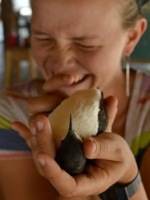
Intersecting the Snake
by Iza Bruen-Morningstar
Iza lives in the Santa Fe River watershed.

It lay half coiled in the road, mottled red and tan, the tail end spread out straight beyond where tires had intersected its body. The snake was alive, with a half-paralyzed body and squished center. I knew nothing of snake anatomy, nothing of what I had flattened. I stood directly in front of its head suspended above the dusty dirt road. It looked at me, tasted me, forked tongue flickering. Masticophis flagellum piceus, Red Racer, meets Homo sapiens sapiens “man wise wise,” who just ran over the snake.
*
The snake got crushed by two vehicles, and four sets of tires, front back, front back. I imagine that once the first set of tires passed over the stretched body, it tried to move off the road and couldn’t. What does it sound like when a snake’s ribs shatter, when insides are forced out? If you lay nearby when it happened, with your ear to the ground, would you hear a faint series of cracks, and a finally an emphatic, muted pop?
I drove the first vehicle that crossed the snake; a coworker drove the second truck. We were young field biologists in Central Nevada, studying the long-term effects of grazing and fire on riparian bird communities. The snake was slender-bellied and long, more than six feet. I crossed closer to its tail than head, the car behind me a few inches closer to the head. I saw the snake, the car behind me didn’t. When we got out of the vehicles the snake had coiled the still-mobile portion of its body up towards a clear sky.
“One of us has to kill it,” My coworker Lauren—who started crying immediately—said, “it must be in pain.” A blinding Nevada day, no clouds, morning heat shimmering off the negative space between shadscale and greasewood.
The question we all struggled with was how. How does one kill a snake that’s watching you from where you stopped it on the road? What does that death look like? Does it come in the form of a jeep aiming itself toward the golden-dollar-sized head of a snake? Or does it look like a steel toed boot-heel twisting hard against the crushing skull? If so, would the snake strike as the boot attempted to make contact? Should this death come in the form of a shovel falling with extra heavy gravity toward an endless neck? Perhaps the answer was simple—just kill the snake, just get it done—but in that elongated moment it didn’t seem so. We deliberated while it sat two feet away, tongue flick flicking.
Lauren ran back to the car and grabbed the shovel. She took a fast step toward the snake, raised the shovel high and stood quivering with it in the air.
The snake. It just watched.
After a long moment, Lauren lowered the shovel. She couldn’t do it.
I asked my coworker Frank, “Can you do it?” His long dirt-browned fingers trembled.
“No!” He fixed his eyes on my face, expression all angst. He’s a vegan; he doesn’t hurt animals on purpose.
It’d be me, I knew. I’d be the one who killed the snake. I saw it first, I crushed it first, and I was the least immediately afraid of death.
“Give me the shovel and walk the fuck away,” I said. Lauren handed me the shovel and paced away sobbing, her hands on her forehead, Frank right behind her.
And then it was me and the snake. She—for I imagined it to be female—looked at me and tasted my scent and I looked at her and couldn’t taste her. No smell. Flies swarmed around the place where insides peeked out.
*
Being there with the snake I wasn’t sure if cutting her consciousness was the right thing. I’m still not. Who am I to determine whether life amid pain is less desirable then the unknown entity of fresh death? The common human assumption is that death is preferable to extreme pain, but what if it’s not? What if consciousness, even amid agony, is precious? Maybe it wasn’t my business to kill that snake, to determine her fate based on my utterly different human experience. But that snake was my business, and I was hers; the last item in her life. Maybe the right thing to do was sit down in the road and wait for her to die, even if that death came in the form of ravens ripping her apart as she faded. Or maybe, the right thing to do was to kill her, consume her flesh and thus keep her—in some small way—in my body. To string her lovely mottled skin out on a long flat board and keep it near me in times of hidden ritual and prayer.
*
She was conscious, in some way, and I knew it. I stood in front her and felt acutely perceived; seen; noticed; tasted. The day heated and ravens called nearby, maybe talking about food, or perhaps love. The snake first tightened her coils and then loosened them, eyes fixed on me. I leaned on the shovel. She saw me and saw me and saw me.
I couldn’t make myself watch when I stopped her watching me. I shut my eyes and raised the shovel above where I knew her head hung in the air and I brought the shovel edge down strong. When I opened my eyes a limp pile of crimson and beige curves lay at my feet. Still barely attached by bits of stretched skin and sinuous muscle was a diamond head with bulging eyes and a forked tongue, reaching away. The body of a snake.
I stood for a moment trembling, leaning on the shovel, and then knelt to move the body from the road and into the dappled shade of a greasewood. I pulled the head—barely attached by sinew, by stretch skin—from the lengthy torso. One trip for the smooth sun-warmed body, coiled around my hands, and another for the head, nearly weightless in my palm.
*
A year later, working a morning bird point count along a road in the Northern Great Basin, I came upon another Red Racer just hit by a car. It lay coiled, inert; but for the flat place near the middle of its length it could have been napping. All its organs remained in its body. I squatted beside it and placed a finger on its back. In the chilly morning, the flesh felt icy, frozen. I leaned in and peered at the body through a magnifying glass, rounded scales stacked upon one another, shimmery red. When I walked back past it two hours later, the snake had not moved, but its flesh and skin had been consumed; only glistening, freshly cleaned white bone remained, 53 sets of ribs curved as hours before the snake had curled.
© Iza Bruen-Morningstar

Latrodectus
by Christopher Greer
Christopher lives in the Upper Chattahoochee Watershed along with millions of other transplants from all across the world.

Sometimes I stop to watch her daily
suffrage unfolding in ripe-shiny rays of
evening’s fading sovereignty. A scarlet
mark, stone-sleek and stark against her
glossy-bodied blackness, betrays her
given nature. She rarely knows I’m
there—between the beam-jamb space, along
the side shed wall, in a corner where
forgotten things retreat to rust away,
collecting dust as time continues. Crusted
leaves, autumn’s latest sweet debris, lie
foundering inside the preying place, entangled
in her chaos, along with mangled would-be
fathers and remains of misled wanderers.
© Christopher Greer
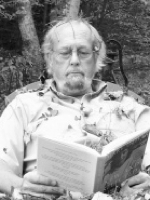
Loonshine
by Richard Sederstrom
Richard was raised and lives in the North Woods of Minnesota and the Sonoran Desert of Arizona. His residences include the Mississippi, Crow Wing, and Salt River watersheds: a very big one, a very small one, and a dead-ended one, all variably enchanting and variably endangered.

After all, it is the nature of loons to swim
even under boats sometimes
but not under this one before, not ours,
not until now
nor wearing these clusters of silver
pearls on her back, which shine, gleam,
pure glow! beneath the lake surface:
The silver of it!
The emerald of its dive.
And not a glisten of it for me alone.
This elemental lack is oxygen
to my moment of joy.
What did Francis declare to be perfect joy?
My joy, likewise severe and likewise difficult
and likewise nowise cursed by perfection,
follows the deepening shine of the bird.
Published in CLMP, "Reflections,"2013 and in the author’s book, Selenity Book Four (February 2017)
© Richard Sederstrom

My Anima, My Doe
by Laurette Folk
Laurette lives between the Bass and Danvers Rivers and walks her dog daily along the last wooded trails of Green Hill, home to foxes, coyotes, fishers, and the occasional deer.

A queen doe
Graced me on the back lawn
After my twins were born
Bowed her great head
For a blessing in the rain.
I walked the city woods
Every morning to get out
To clear my head, look for her
In the soft, littered marsh.
Once I found her eating acorns on the trail.
With neither faith nor fang, we were kin
The queen hesitated, and my dog
Moved between us—a breach.
I did not hear a horn
When she rose up,
Her hooves tapping at the hoods of cars
Landing on the snowy bank
On the other side of the river.
It was not I who killed her.
At night my daughter writhed
Possessed, in her bed.
(You wouldn’t hurt them, my mother said)
In the morning, my neck split,
Pain to accompany dulled pain.
Hushed cries, soiled diapers,
Pills in the drawer,
From the window, white pillows of snow—
I know this to be true:
She didn’t have a herd.
She didn’t have other bodies
To keep her warm
She had eaten all of the Scotch pines
Half way up.
She had eaten things she
Shouldn’t eat.
The Vets pitched tents back in those woods, then.
I had found remnants—bottles, sleeping bags
Clothing, junk food. Nips. Would I find her
Hanging from a tree, skinned?
Are we not always beholden to hungry mouths?
One morning I held the
Idyllic white city in my palm
Its white spires above whiter snow.
Below—the fisher’s killing grounds,
Littered with feathers, limbs, skulls, bones.
My dog had found a buried hide,
The brown of the hide—I knew.
I went alone at sunrise with a shovel
Scared the hawks away from the carcass
I hacked at the ice and pain buzzed in my hands
I hacked at the ice and found
Not a hoof, but a paw.
In March, the river began to thaw.
I stood at the top of the icy trail
Debating my precarious descent
When I saw her
Bounding from ice floe to ice floe
As light as the air of eternity.
Your deer is dead, said a neighbor, in April.
Her body had been photographed.
Her body had been ravaged.
I asked the woman who collected the heroin needles
From the banks for her whereabouts.
I picked daffodils for a nosegay.
We searched the north and east sides
Of Green Hill and found neither hide nor
Hoof, nor bone.
Late August and the undergrowth consumed
Every last thing.
Rumor had it a herd of deer swam to Misery Island
And back. People in kayaks saw them gliding through
The water like wraiths.
But here on the north side of Green Hill, a rustle
In the dead wood of the brambles,
Beyond the old growth trees,
Beyond the thatched grasses of the marsh
The white off her back
Looked nothing like surrender.
A version of this poem was published in the author's book Totem Beasts (May 2017).
© Laurette Folk
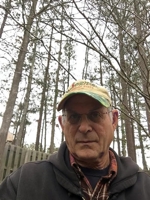
Night of the Frogs
by Richard Lebovitz
Richard lives in the Upper Chattahoochee Watershed in the Georgia Piedmont. His small backyard is a National Wildlife Federation (NWF) Certified Wildlife Habitat and Georgia Native Plant Society (GNPS) Certified Native Plant Habitat, and he participates in GNPS rescues to save native plants from the path of development.

Rain poured from the darkness,
pummeling the pavement,
and the tide rose,
flooding the marsh,
and the creeks filled,
lapping at the roadsides,
till they joined hands
in the middle.
And the frogs came up
and covered the highway,
headstrong and reckless,
driven by who knows
what primal instinct
or blind ambition
that would make them
fling themselves so fearlessly
into the unavoidable path
of so many onrushing cars.
We could see them,
their frenetic hopping,
their flattened aftermath,
a Greek tragedy
played before our headlamps
on an asphalt stage.
© Richard Lebovitz
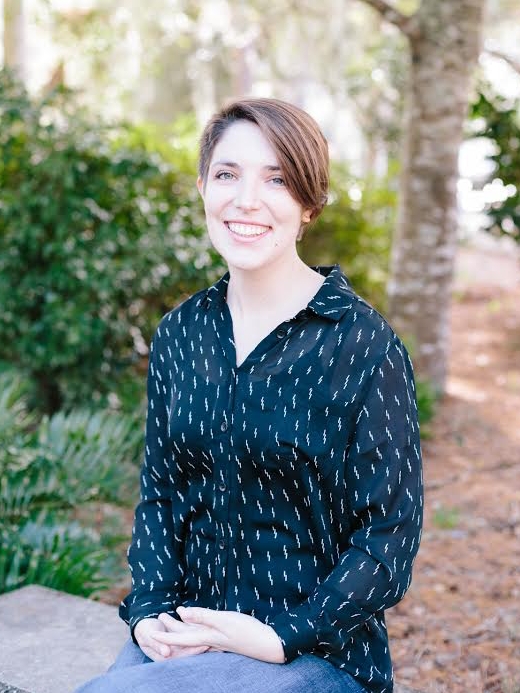
Southern Oscillation
by Samantha Grenrock
Samantha lives in the Oklawaha watershed near Hogtown Creek and the Cabot-Koppers superfund site. The canopy is all banana spiders and Spanish moss.

The people wish to be de-ionized.
They approach the juice bar,
wishing to be cleansed.
Once they drank dew fallen from roses,
then mineral water, taken for the cure,
then aloe, desert-pressed. Emerald juices
scrub out mitochondria.
Everyone’s pH is out of whack.
Everything’s on fire.
The children gallop around screaming
freedom from fluoride. Jubilee at the end
of critical thinking.
On the equator, a monstrous El Niño
breathes in light. The people take shavasana.
No land for days.
Humpbacks savage whale watchers
with slow grace. The horoscope says everything
will be just okay.
© Samantha Grenrock

Subject to Contract
by Vernita Hall
Vernita is a lifelong Philadelphia native. In her northern neighborhood of old houses and quiet streets, Kwanzan cherry trees, azaleas, and rhododendrons glorify each spring.

Anticipating man's
performance
as steward
our script includes
extremophiles and cockroaches—
just in case
we interrupt this broadcast
A quick commercial break
and we recast—
before we've lost
our target audience
A seamless exit
is preferred
There will be
no curtain calls no encores no refunds
no cast party (No catcalls, please!)
no reruns no residuals no syndication
no press release
no—N-O—re-negotiation
We may have to wrap this up
sooner than later
terminating
his contract
faster than
man's anticipating
© Vernita Hall
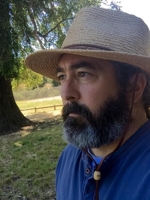
Suburban Scene
by David Denny
David lives a stone’s throw from Stevens Creek, which empties into Whisman Slough, then into the south leg of a large tidal marsh popularly known as the San Francisco Bay. The creek drains a watershed of approximately 29 square miles.

The mountain lion sleeps in the sycamore.
He is first spotted by the jogger, who calls
the sheriff, who calls the game warden.
They stand now at a safe distance while
the animal twitches and the great black-tipped
tail sweeps. He is stretched out across
a heavy horizontal branch where trail turns
sidewalk. Nearby a plaque lists the names
of the city council who sanctioned this paving.
Cars slow. Neighbors gather and whisper.
No one asks what has brought the creature
down into the land of poodles and dachshunds,
to the level ground of trash trucks and school
buses, backpacks and briefcases. Like the
skinny deer who come to sip at the creek,
the drought has drawn him down from the hills.
The warden considers his options. 180 pounds,
he guesses, of tawny muscle and claws and jaws.
When he awakens it will be to prowl and stalk
and devour. The cop thinks of his two-year-old
standing naked in the kiddie pool. The neighbors
notice the strong musky tang, how it lingers
in the absence of breeze. How long has this
beast been snoozing among us? What havoc
will awaken when he springs to the ground?
The warden slides a tranquilizer dart into
his rifle. The cop cracks open his shotgun
and loads both barrels. The neighbors take
another step back from the caution tape,
point their camera phones as the lion stirs,
yawns, stretches. Dusk soon. The cool
darkness calls. His yellow eyes blink open,
survey the hunting ground, rich with prey.
© David Denny

Tearing Out the Blue Girls
by Jeremy Cantor
Jeremy lives with his wife in a small town in the Suisun Bay Watershed on a tidal strait connecting the Sacramento River with San Francisco Bay. Summer evenings he goes fishing downtown from the pier at the foot of First Street, while the sun sets behind the bridge and the sea lions dive for salmon.

We dug the roses from their corner plot.
They'd done well there, but sadly we agreed
that we had erred severely in their placement
and thrown the yard's design into imbalance.
We tore them out.
But fragmentary rootstock
spread and sprouted, its rough pedigree
exposed for all to see. The elegance
of what was grafted to it, long since gone,
has been replaced by something old and tough,
in colors we'd not planned, in shapes unbidden,
with leaves unlike the ones we'd hoped to see,
with thin and arching stems, not solid stalks,
and, unlike the roses we had killed,
with simple blossoms – just five petals each.
They come up where they will, and when, and how.
They'll still be there when all the rest is weeds,
wild grasses, asphalt rubble, stucco shards,
a barely recognizable foundation
and sun and dust
and wind and rain
and crickets.
From Wisteria from Seed. © Kelsay Books, 2015.
© Jeremy Cantor
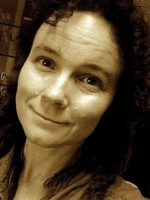
Tupelo Coyote
by Wren Tuatha
Wren Tuatha is a climate refugee, having escaped the ongoing fires of California for the Cayuga watershed of the New York Finger Lakes.

We were tracing Jack’s Creek
where the woods abducts it from the rolling
hills of dairy cows and tobacco,
I on the asphalt, you behind the tupelos.
You stalked me like a fan
afraid to ask for my autograph,
those alien eyes,
calculating,
measuring my marrow
bend after turn, always
thirty paces aside.
Now you trot out in the farmlands,
legs like tobacco sticks, mapping the median line.
I am roadside, reading.
You are storybook real.
I speak to you, familiar,
as if you are the family dog.
Your answer is a glare-beam
that rips me, rights me.
You put me in the landscape,
that’s all.
© Wren Tuatha
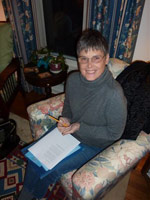
We'll Cross that Bridge ...
by Juditha Dowd
Juditha lives in Delaware Township, New Jersey, near the river of the same name in the Middle Delaware-Musconetcong watershed.

Finally the sun. Perfect day to walk the Wickacheoke Creek, trees spring green and copperheads still slumbering under their rocks. But the Weather Channel wants me worrying about the earthquakes down in Ecuador. One world, get used to it … Look at the creek bank, those signs protesting a pipeline that would transport natural gas.
Another Fracking Land Grab!
You do NOT have permission to survey My Land!
They’ve targeted good farmland, acres we’ve protected with donations and tax dollars, parcels that will cost less because they’ve been preserved. Locals talk of eminent domain … Over there, where Hurricane Sandy downed five oaks, skunk cabbage takes advantage of the rain. Can’t stop progress. Now where’s the swan? Not in this eddy where I often find her swimming, where the pipeline’s route is defined by yellow crime tape … Time to recheck the weather, get an update on the fires ravaging Alberta. Fire counts as weather now. Just last week one took the Rosemont Café. Nobody knew how to work the extinguishers, not the café owner or his three upstairs tenants who lost everything. Well, not their lives. This isn’t Zimbabwe, not yet. We have no hydrants here in Rosemont, so firemen had to tap the Wickachoeke, challenged by some hikers asking Isn’t that against the law? … If we come to it, cross that bridge, where will the snakes and birds go?
© Juditha Dowd

White Tango
by Derek Otsuji
Derek lives between the Ko‘olau Mountains and Kewalo Harbor on the southern shore of Oahu.

Nature selects from auditions of vast
variety and kind, whittles down the motley
ragbag while paradoxically adding
to beauty, strangeness, till the elegant
oddity be achieved, the fit performance
suited not for survival merely, but
pageantry—queer couplings, entanglements
of mutual cunning, desire twined
in tango to a music of its own
making. How many eons before that
choreography achieved a shapely
dance, life’s swift movement through its fecund forms?
The desert flower of the Suguaro cactus
blooms for one night under a desert moon,
for one night, secretes its seductions of
nectar and scent, honing the fine hunger
of the lesser long-nosed bat who plunges
his muzzle into the floral tube (that
fragrant envelope), guzzling his fill, till
his furry head, dusted with pollen, lifts
back into air, shaking the gold spores
in a downward float fall like a blessing
to blush cold flesh of that moon-blanched flower
for one night lit beneath a flowering moon.
© Derek Otsuji

Without the Flood
by Jacqueline Balderrama
Jacqueline lives in the Jordan River watershed with a surrounding view of the Wasatch Mountains and the Oquirrh Mountains.

There’s not just one story of disappearance
in a one-hundred-year flood zone, where runoff
from the Santa Ana had all my life been dry or nearly,
which is to say the flood is never coming.
My sisters and I lived near alley-like fields marked by the negative
space of fenced-in backyards, their overhanging fruit:
crab apples to be cut down in five years
apricots, pomegranates. We named a dog there
by the brand of its license and pet it through the chain-link
a few fingers at a time until we were told,
Top Paw was taken to the pound.
Far off, the missing river is partly cemented
and heats itself. Can a flood happen without water?
In the field, we throw clods of dirt into overgrown corrals
of jimson weed, its trumpet blooms, and abandoned horse sheds.
What belonged to the river was nothing.
© Jacqueline Balderrama